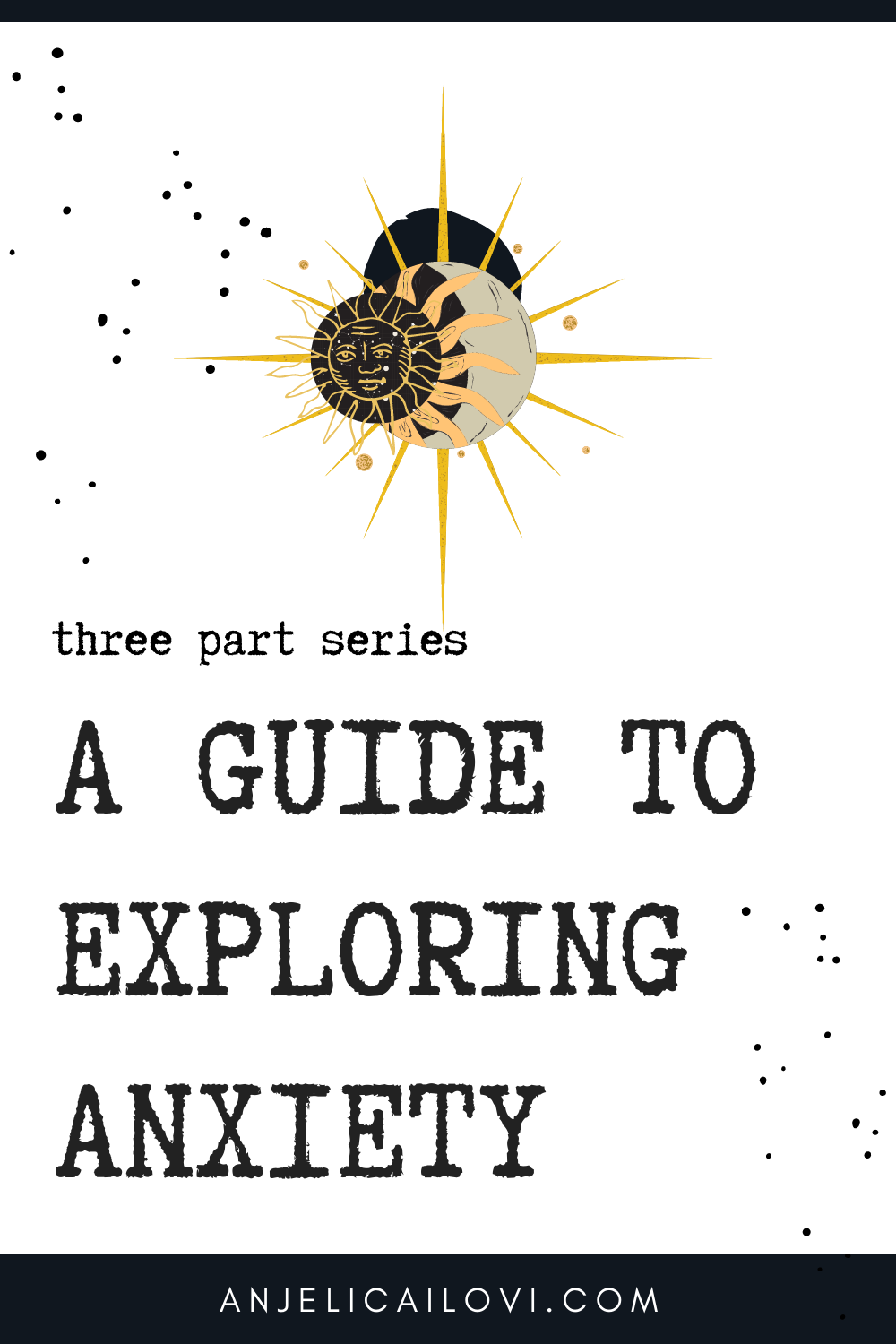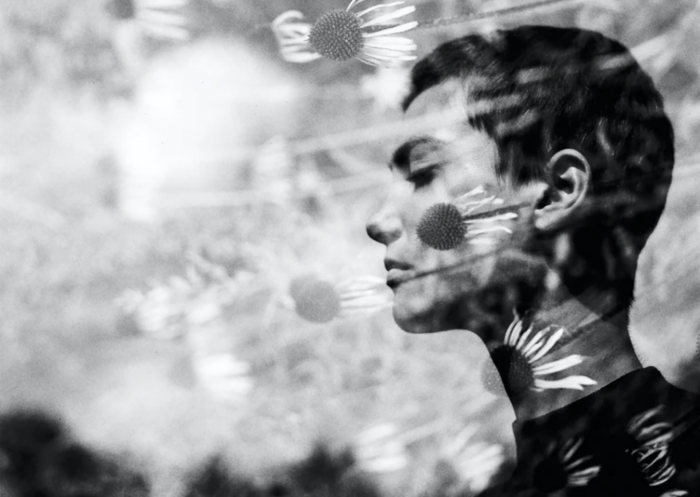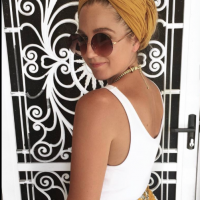Author’s note: this three part series is an in-depth exploration of anxiety and the possible reasons you may feel anxious.
~
Everything I write here demonstrates how deeply engrained anxiety was throughout my life.
I was crippled by anxiety—it ruled my mind, body, and life.
But through patience, anxiety became my friend (even though it feels horrible at times). I now believe that anxiety can be a warning signal that something is off-balance, and depending on how we view it, an opportunity to dig deep and discover why.
I have learned to appreciate how, collectively, my body, mind, and spirit are dedicated to helping me live a healthy life. My friend, anxiety, shows itself through body signals, mental chatter, and other symptoms that I need to pay attention to.
And when we view anxiety like this, it’s life-changing.
By listening and tuning in, it has resulted in healthier living, a deeper understanding of self, and freedom from beliefs that used to hinder my life.
So, I wanted to create this exploration of anxiety for you as it may be useful in your journey of well-being, healing, and self-awareness. The uneasy feeling of anxiety may be a request from your inner being to create a healthy life and explore your personal unknowns. By doing so, you may discover habits, beliefs, or contributing factors that are causing the current of discomfort.
Before we dive in, let’s talk about the importance of creating a healthy lifestyle and why this will assist in your exploration of anxiety. There’s a lot of information in this series. By starting off with this introduction, it’ll set the stage for later topics.
Why we need to create a healthy lifestyle:
By creating a healthy lifestyle with practices that lead to calmer living, it will prepare you for the bigger questions and the more uncomfortable aspects of oneself that need to be faced in order to heal, transform, or simply understand.
Self-exploration is part of the journey of becoming free from long-term anxiety, or, at least, being able to manage it more efficiently. I have not offered you solutions to calm yourself just in the moment. I have carefully and considerately put together a collection of reasons why you may get anxiety on a surface level and on a deeper level.
In this day and age, quick fixes and fast solutions are deeply engrained into every corner of health, fitness, and spirituality. However, we all know that the best things in life come from time and commitment—just not always immediately (hardly ever, actually). We also know that the most challenging quests in life come with ups and downs. They are imperfect, messy, and there are bound to be plenty of times when we stumble. It’s all part of the transformation, growth, and healing. It is also a necessary aspect that must be played out if we are to get to the root of our troubles, and that uneasy, anxious current that exists in our lives.
Indulge yourself on a quest to create practices that prepare you and build you first. Think of it this way: we don’t build a house on sand, we lay a foundation first—and then build it. Why? A house built on sand will sink or a storm may cause it to fall, as it lacks a foundation.
A house built on a strong foundation (unlike sand) is more likely to withstand time, the weather, and adversity. At worst, if a storm hits the home, the strong foundation will remain.
You are the foundation.
The life you build, your career, your relationships, the stuff you have—are the house. But too often, we build our lives on those external things and forget ourselves: the most important part of building a life is us.
Anxiety can be a beast when we have no foundation. That is why it is important to create a healthy lifestyle that allows you to feel calmer in your mind and life regularly. It is about understanding all the corners of yourself, your spirit, and your mind. Your body must also be taken care of. A strong, fit, healthy body that is well nourished will protect you in times of stress and imbalance.
More importantly, when things get tough, a hardship occurs, or you’re rattled to the core, you may feel anxious in the moment but you will have a solid foundation to fall back on—yourself.
You’ll have the lifestyle you built with practices you have committed to that lead you straight back to being grounded and knowing what to do. When the emotions die down, you will feel you are okay no matter what. You will remember who you are, what you stand for, and that you can withstand the storms.
You will view anxiety differently. And that will make all the difference.
Because life is never going to be smooth sailing all the time.

How to approach this series:
This is not a cure. It is a guide, an invitation to go on a quest and encourage you to ask questions to healthily review habits, thoughts, and lifestyle choices that can contribute to being anxious.
Anxiety is a complex phenomenon. In psychological science, there are forms of anxiety that are considered a disorder. And while I don’t disagree, there are things we still don’t understand about the human mind, body, and brain so it is not always as straightforward as a disorder. I believe there are many reasons why we are visited by anxiety. Do I think we will never ever experience anxiety again if we create a healthy lifestyle? No. But I do believe we won’t be as afraid of it.
And more importantly—do we really want to be free of a natural warning sign that provides feedback to us that something is off?
The issue is not anxiety itself. It’s just that for some of us, stress and anxiety is our default—it’s all we know and all we are used to, due to our upbringing. It’s how we have lived for a long time. And it’s uncomfortable. Even when life seems to be good, it can loom in the back of our minds.
Have you ever been so happy and joyful, and suddenly feel dread? Like, this feeling that something could go wrong—even though nothing does? Perhaps, like me, we are so used to feeling stress, anxiety, and worry that when life is well and good, we are simply not accustomed to it. We are conditioned and familiar with living in an anxious state. It’s no wonder that being calm and peaceful are difficult to practice and to actually live day-to-day.
So, that’s what I want to address here. We don’t want to banish anxiety, we want to understand it and perhaps recondition our body, mind, and spirit so that anxiety only operates when something is off-balance or needs attention. And that can be for so many reasons, hence a three-part series.
How does anxiety feel?
Anxiety is experienced differently by everyone—and many times, like myself, people don’t realise it is anxiety they are feeling. Anxiety can feel like this desire to run away and find a place where you can breathe. It can be ever so subtle or it can be extreme, wreaking havoc on your mind. I feel anxiety mostly in my stomach, like this uneasy feeling that something is wrong. The butterflies, I call them. If it’s really bad, I start to feel like the walls are closing in, and I’m suffocating. Or like something “could go wrong.”
It can also show up like this:
>> Frustration
>> Overthinking or darting thoughts
>> Assuming the worst
>> Catrophising
>> Difficulty trusting even with contrary evidence
>> Fidgeting
>> Shaking legs
>> Opting for substance use to chill or escape
>> Isolation
>> Worry
>> Thinking about what other people think of you excessively
>> Digestive problems
>> Headaches
>> Tension in the neck, shoulders, back
>> Difficulty winding down
>> Insomnia
>> PMS
>> Feeling trapped
>> Doubting yourself
>> Unable to make decisions
>> Perfectionism, OCD
>> Fear
And a lot more.
Rather than just cope with the anxiety, I wanted to find ways to get to the core of why I get anxious, because I simply couldn’t stand feeling like that all the time.
It’s now become a positive part of my life, even when it rears its head and says, “Hello Anjelica, remember me?” Now, when it decides to knock on my mental door, I view it as a warning sign that something is off in my life, and that I need to pay close attention, not just cope with it. Or ignore it or let it control my movement.
Viewing anxiety, worry, and stress, or any dilemma for that matter, in this way, can help solve problems and lead to peace. And if something isn’t completely resolved, it can minimize our fear around anxiety rather than it having a controlling grip over you.
It’s taken a good seven years to live a calm, centered life without anxiety crippling my every move. That’s a long time. But I didn’t want to live that way forever, so I kept questioning, asking, and seeking. I wanted the hidden or unconscious parts of myself to surface so I could deal with it head-on and not be robbed of tranquility.
The work I have been doing all these years has paid off. I did have to change a lot—and honestly, change is hard. It’s tempting to stay comfortable, even if it’s miserable. But I now see anxiety as something that I can use as a guide to question an imbalance in my life. I am forever learning. I think that’s been the greatest turning point with anxiety—acknowledging that I will still experience it at times, but we are now friends, not enemies.
Fast forward to today, I see anxiety as a call to grow, upgrade my thinking, or take time for self-exploration. If I feel anxiety rising up within, I am now comfortable asking myself, “What is the possible meaning of this?” Once upon a time, I was so afraid to feel anxiety and I wanted to escape it. I hated the dreaded heaviness in my gut and that feeling of being out of control. It was like an impending doom that something could happen, and I would tiptoe through my life cautiously and worried. Mainly, I lacked peace, which is why anxiety is so frustrating.
It robs us of stillness.
I used to think anxiety was a weakness
Unfortunately, anxiety is still stigmatized today. When we feel something is wrong with us, we may feel uncomfortable talking about it. Over time, I have witnessed people denying having anxiety as though it is a weakness. I was once one of those people, so it’s easy to recognize it in others. For 25 years, I struggled with it alone and never told a soul. When I finally opened up about it, I realised how common it is amongst us. I didn’t even know what I was feeling was anxiety. When I admitted to myself that I get really, really anxious—and that I denied it for so long—that’s when I felt liberated. I was no longer harboring this secret, this, “weakness.” Denial can keep us from growing and taking a good, honest look at ourselves in order to initiate change.
In this series, I am going to refer to anxiety as an experience—not a disorder.
Whether or not we have been diagnosed with anxiety, is not the premise of this exploration. We’re going to be objective and we are going to go through a large list of possibilities that could result in anxiety. Personally, over a seven-year period, I have analysed, questioned, and changed specific areas to get to the root of my anxieties. From there, I also embarked on a journey into my soul and my past to face parts of myself that were possibly causing an uneasy current within. This entire period of my life has resulted in some fabulous findings and practices that have yielded a calmer mind and life.
I hope by sharing these points, perhaps they will inspire you to create a different relationship with anxiety. Everything listed, I have gone through personally. This probably gives you an indication of how anxious I was for most of my life. My desire to leave short-term fixes behind and no longer just “deal with it” helped me discover many layers that were disrupting my peace on a neurological, spiritual, and physical level.
This is not to say you need to change your entire life overnight. Choosing to heal an area organically opened the door for another area that needed healing. If you are willing to go on a gentle quest, it will unravel naturally. If you fight it or try to control it, or rush the journey, it’s a little more challenging to maneuver through and may result in more anxiety!
Things to digest first:
Our upbringing:
From birth until age seven, our brain is like a sponge, absorbing everything in our environment—including how we are treated and what we are taught. We don’t yet know what to filter and what to retain. Therefore, the beliefs and teachings become the basis of how we think, act, and grow. The way we eat and move can set us up for unhealthy or healthy habits, and impact our body size, wellness, and how we view ourselves. The people we observe, the things we witness—these are all impacting how we learn, what we take on, and how we make decisions.
Furthermore, anxiety, for some of us, may have been a way to cope with things out of our control. It could have been a trait we learned from those around us. But it may also have been a signal that something was off—whether it was how you were treated, or whether you had freedom, or not. Those of us who felt controlled, silenced, or judged, for example, our expression and worth were threatened. Knowing this helped me to have more compassion for myself and others with anxiety.
Our diet—mental and physical:
What we consume and allow into our lives can affect our brain, thinking, and peacefulness—and that goes for both food and external information, such as social media, relationships, and environment. Food can impact our blood sugar levels and organ health, creating imbalances in our hormones and brain. This can result in feeling anxious or “off.” It can also impact our sleep. Our mental diet is also vital to keep a balance. What we allow into our lives and the type of people we open our hearts to can contribute to anxiety.
Our physical movement:
A lack of exercise and too much exercise can contribute to anxiety. Not enough exercise does not give your brain the opportunity to tap into receptors that release calm vibes throughout your body and mind. Too much exercise may be driven by an external need for validation (anxiously driven), and it can also cause havoc on our adrenals, cortisol levels, and other healing properties.
Our environment—past, present:
Our surroundings can have an impact on us psychologically and physically. If we were surrounded by chaos, drama, anger, or emotional abuse for example, it can cause havoc on our nervous system, leading to feelings of anxiousness. This may also be viewed as edginess, being jumpy, walking on eggshells, feeling afraid, worried you might rock the boat—these are all forms of anxious thinking and living. Even if we are free from our childhood surroundings, a similar environment can cause us to feel anxious, even later on in life. This includes the spaces you are in, such as your home, and why it is important to declutter, clean, and be mindful of what you have around you.
Our mental habits:
We’ll also go through beliefs you may have about yourself, and we’ll challenge those beliefs to see if they are healthy for you or causing anxious thinking.
Some of our beliefs are hardwired from a young age, as mentioned above, so it does take time to declutter patterns that have been operating for quite some time. Furthermore, we may have had a belief growing up, and then, as an adult, we have been in situations that almost “confirm” those beliefs. For example, our idea of love may be pain, or being controlled, or having to prove ourselves. We end up in relationships where there is abuse or misery and wonder why. Our belief system may need to be reconditioned.
When I was finally in a calmer space, I also realized that I kept waiting for “something bad to happen” because I had become so accustomed to letdowns, disappointments, and betrayals from people. This is where we need to renew our thinking so we don’t sabotage ourselves—and the healthy lifestyle we have built.
My hope is that by sharing this list of reasons why you may experience anxiety, you can view it from a different perspective. Perhaps it will encourage you to be kinder with yourself. Maybe it will spark in you a desire to go on a journey of introspection. It could motivate you to make some lifestyle changes. Or you may find that you simply need to just be for a while.
There may be things that irritate you and you may feel annoyed by this post—I get it. But please remember, this is not from a textbook. It is lived and breathed; it comes from falling and getting back up a million times!
~
Read the full series here.









Read 2 comments and reply